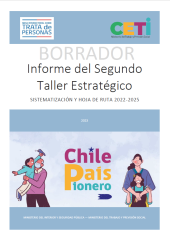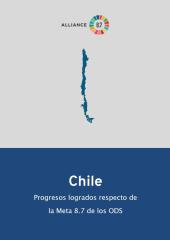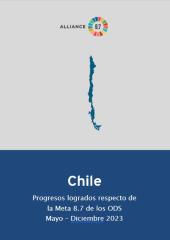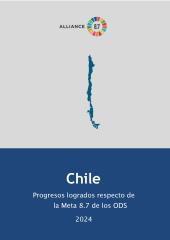Learn more about Chile
Priorities
- Promote research and knowledge-sharing around SDG Target 8.7. Qualitative and quantitative studies ensure that data is generated and updated, while strengthening comprehensive lines of action around SDG Target 8.7. With support from UNICEF and the ILO, the country is taking steps toward implementing a new National Survey on Activities of Children and Adolescents in 2020.
- Sensitize, raise awareness, and inform the general public about the challenges of the SDG Target 8.7. Training plans should be developed, which facilitate awareness- raising and information-sharing on SDG Target 8.7. Social dialogue that incorporates the challenges of SDG Target 8.7 in tripartite fora should be undertaken.
- Create and modify procedural instruments to improve the prevention, detection, and management of cases of the violation of rights associated with SDG Target 8.7. An early warning system to prevent cases of risk of violation of rights associated with SDG Target 8.7 should be developed. In addition, the instruments for detection and referral of cases need to be strengthened and updated.
- Evaluate and promote legal and regulatory modifications that strengthen the prevention and protection of rights associated with SDG Target 8.7. Procedures should be established for the referral of cases in the “Protocol for dealing with victims of human trafficking” and other protection protocols. Moreover, relevant national legislation should be reviewed, and required changes should be made, with respect to SDG Target 8.7.
Progress
- Adoption of a second Roadmap for Chile as a Pathfinder Country.
- Reactivation of the Ministerial Advisory Commission for the Elimination of Forced Labour in Chile (CAMTRAFOR) and initiation of work on the design of the National Action Plan for the Elimination of Forced Labour.
- Redesign of the website dedicated to the eradication of child labour in Chile (www.noaltrabajoinfantil.cl)
- Testing of the questionnaire for the National Survey of Activities of Children and Adolescents (EANNA) 2023, that will provide data about child labour in Chile
- Update of the Criminal Investigation Guide on the crime of Human Trafficking
- Launch of the study "Characterization of the situation of human trafficking in Chile"
Child Labour
- Chile increased inter-sectoral coordination, by:
- Establishing a commission for the prevention and elimination of Child Labour and inter-sectoral roundtables against Child Labour and Human trafficking.
- Establishing a strategic alliance with business networks for children.
- Incorporating new members to the Inter-sectoral Table on Trafficking in Persons that can offer targeted assistance to victims with a particular focus: children and adolescents, trafficking in crisis and emergency situations and trafficking in persons with disabilities.
- Actively engaging with regional bodies on the prevention and eradication of child labour and through the intersectoral roundtable on trafficking in persons.
- Chile has been named by the Department of State of the United States Government, again (seventh consecutive year) as a country that complies with the minimum standards for the elimination of human trafficking, in accordance with the TVPA Act of the United States and the UN Palermo Protocol. The group of countries that meet these standards are defined in the “Trafficking in Persons Report 2020” at Level 1 known as TIER 1.
- Along with the Memorandum of Understanding on Trafficking in Persons in force with Ecuador, Chile has an Agreement in force with Peru and Memorandums of Understanding with Argentina and Colombia on prevention, investigation and protection of victims of trafficking in persons.
- Through the incorporation of Chile as a Pathfinder Country of the Alliance 8.7, public policies associated with the prevention and eradication of child labour and human trafficking converged, and synergies and gaps have been identified.
- Chile is increasing capacity and awareness on child labour, forced labour, and human trafficking through a series of national and regional workshops, awareness raising activities, including, among others, the launch of the national Campaigns “Chile sin trabajo infantil” and #ChileSinTrata and several regional activities on the occasion of the World Day Against Child Labour.
- Chile has increased training on child labour, forced labour and human trafficking for civil servants, Government officials, the police, educators and others.
Human Trafficking
- At the international level, Chile played an active part in increasing international cooperation on the subjects of Child Labour, Forced Labour and Human trafficking in the following manner:
- Under the framework of the “Memorandum of Understanding on Prevention, Investigation and Protection of Victims of Trafficking in Persons” between the Ministries of the Interior of Chile and Ecuador, a Binational Road Map was established to exchange good practices regarding the prevention of trafficking of children and adolescents.
- Technical assistance was given to Paraguay on the implementation of the national strategy for the eradication of child labour and protection of adolescent workers 2015-2025
- Active participation in the Regional Initiative Latin America and Caribbean Free of Child Labour
- Workshops were organised with the financial support of the Chilean international cooperation agency on the detection and referral of victims of human trafficking in Central America
- Chile presented a draft law to update the regulations on the hiring of children and adolescents. It focuses on their rights, includes maximum daily working hours and an increase in the fine for failing to request an aptitude test for mining work for persons under 22 years of age.
- Chile has developed a strategy to generate labour opportunities for families with children in child labour.
- Chile is increasing its knowledge base on child labour, forced labour, and human trafficking through:
- Collaboration with Academic Institutions (to encourage students at the University to prepare undergraduate theses or research work on child labour), with the Andrés Bello University, Santo Tomas University, Finis Terrae University and with ECLAC (United Nations Economic Commission for Latin America and the Caribbean).
- The development of the national survey on children and adolescent activities (to be implemented in 2021) and the annual update and publication of statistical information on trafficking in persons.
International Instruments
| Área | Ilo Instrument | Estado | Ratification date | CEACR comments |
|---|---|---|---|---|
| Child Labour | C138 Ratification of C138 - Minimum Age Convention (1973) |
In Force | 01 Feb 1999 | |
| Child Labour, Forced Labour, Human Trafficking, Modern Slavery | C182 Worst Forms of Child Labour Convention (1999) |
In Force | 17 Jul 2000 | |
| Child Labour, Modern Slavery | C029 Forced Labour Convention (1930) |
In Force | 31 May 1933 | |
| Forced Labour, Human Trafficking, Modern Slavery | P029 Protocol of 2014 to the Forced Labour Convention (1930) |
In Force | 19 Jan 2021 | |
| Forced Labour, Modern Slavery | C105 Abolition of Forced Labour Convention (1957) |
In Force | 01 Feb 1999 | |
| Child Labour, Forced Labour, Human Trafficking, Modern Slavery | C143 Migrant Workers (Supplementary Provisions) Convention (1975) |
|||
| Child Labour, Forced Labour, Human Trafficking, Modern Slavery | C181 Private Employment Agencies Convention (1997) |
|||
| Freedom of Association | C087 Freedom of Association and Protection of the Right to Organise Convention (1948) |
In Force | 01 Feb 1999 | |
| Freedom of Association | C098 Right to Organise and Collective Bargaining Convention (1949) |
In Force | 01 Feb 1999 | |
| Discrimination | C100 Equal Remuneration Convention (1951) |
In Force | 20 Sep 1971 | |
| Discrimination | C111 Discrimination (Employment and Occupation) Convention (1958) |
In Force | 20 Sep 1971 | |
| Occupational Safety and Health | C155 Occupational Safety and Health Convention (1981) |
Not In Force | 10 Jun 2025 | |
| Occupational Safety and Health | C187 Promotional Framework for Occupational Safety and Health Convention (2006) |
In Force | 27 Apr 2011 |
| Área | UN Treaty | Signature date | Ratification date | Estado |
|---|---|---|---|---|
| Child Labour | IV-11 Convention on the Rights of the Child (1989) |
26 Jan 1990 | 13 Aug 1990 | |
| Child Labour | IV-11-c Optional Protocol to the Convention on the Rights of the Child on the sale of children, child prostitution and child pornography (2000) |
28 Jun 2000 | 6 Feb 2003 | |
| Forced Labour, Human Trafficking | PALERMO_PROTOCOL Protocol to Prevent, Suppress and Punish Trafficking in Persons, especially Women and Children, supplementing the United Nations Convention against Transnational Organized Crime (2000) |
8 Aug 2002 | 29 Nov 2004 | |
| Human Trafficking, Modern Slavery | XVIII-4 Ratification of the Supplementary Convention on the Abolition and of Slavery, the Slave Trade and Institutions and Practices Similar to Slavery (1956) |
20 Jun 1995 a | Accession |
Sources: ILO Normlex & UN Treaty Collection
RESOURCES

TALLER ESTRATÉGICO ALIANZA 8.7 CHILE
Documento

Chile Informe del Segundo Taller Estratégico y Hoja de Ruta 2022-2025
Documento

Chile - Informe de progreso de país pioniero, 2021-2022
Documento

Chile - Informe de progreso de país pioniero, 2022-2023
Documento

Chile - Informe de progreso de país pioniero, mayo - diciembre de 2023
Documento

Chile - Informe de progreso de país pioniero, 2024
Documento